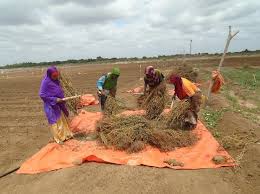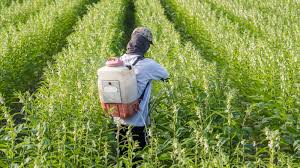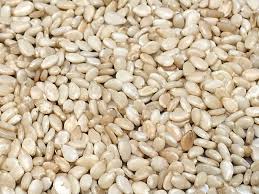![]()
If you’ve landed on this article page, you’re probably searching for a
good business idea—an idea that’s light on the pocket but heavy on
returns, promising both a fulfilling journey and potential profit.
|
How to Start Sesame Farming in Nigeria
Sesame seed farming refers to the cultivation of the edible
seeds of the flowering sesame plant. The scientific name for
sesame is Sesamum indicum, which belongs to the Pedaliaceae
family. Sesame is grown in many parts of the world, including
Nigeria and Africa, for its oil-rich seeds, which have various
uses in food, pharmaceutical, and cosmetic industries.
Sesame seeds have a thin shell or husk which needs to be removed
and this process is known as dehulling. The weight of hull is
about 17% of total weight of sesame seed. The hull contains a
great deal of oxalic acid and indigestive fibre. Oxalic acid can
reduce biological utilization ratio of Ca in Food and influence
taste.
After sesame hulling, oxalic acid can reduce from 3% to 0.25% in
sesame seeds, which improve the protein digestibility greatly.
So, dehulling of sesame seeds is the precondition of enlarging
application of sesame in food field. Hulled sesame seeds are
softer and tastier than unhulled seeds. Sesame seeds are also an
excellent source of unsaturated fatty acids and phytosterols.
The dark seeds are cleaned by subjecting them to an alkali
treatment for a few minutes. The seeds are then washed with cold
water to free the product from traces of alkali. The processed
seeds are then dried and are white and rid of bitterness and of
good nutritive qualities. The removed outer coat has the bitter
oxalic acid and the seed is now bereft of fungal infections.
Research has shown that sesame seeds are rich in nutrients,
including healthy fats, protein, fiber, vitamins, and minerals.
They also contain bioactive compounds, such as lignans and
phytosterols, which have antioxidant and anti-inflammatory
properties that can promote good health.
Selecting the Right Location: Selecting the right location is
crucial for successful sesame farming
in Nigeria. Choose a site with well-drained sandy loam
soil, as sesame does not tolerate waterlogging. The location
should receive plenty of sunlight, as sesame requires full sun
for optimal growth and yield. Avoid areas prone to flooding or
with high clay content, as these can hinder root development and
lead to poor yields. Additionally, consider the proximity to
water sources for irrigation, as sesame requires regular
watering, especially during dry periods. Selecting the right
location ensures that your sesame crop has the best possible
conditions for healthy growth and high yields.
Preparing the Land: Preparing the land is a critical step in
sesame farming. Begin by clearing the land of weeds, rocks, and
debris to create a clean planting area. Plow the soil to a fine
tilth to ensure good seed-to-soil contact and proper drainage.
If the soil is compacted, consider using a harrow or cultivator
to loosen it. Adding organic matter, such as compost or manure,
can improve soil fertility and structure.
Choosing the Right Variety: Choosing the right variety is
essential for successful sesame farming in Nigeria. Select a
variety that is well-suited to the local climate and soil
conditions. Consider factors such as drought tolerance, disease
resistance, and yield potential. Popular varieties in Nigeria
include Ex-Sudan, Ex-Benin, and Ex-Nigeria. Ex-Sudan is known
for its high yield potential and good resistance to lodging,
while Ex-Benin is valued for its early maturity and drought
tolerance. Ex-Nigeria is a local variety that is well-adapted to
Nigerian conditions. By choosing the right variety, you can
maximize your sesame crop’s yield and quality.
Planting: Planting is a critical step in sesame farming in
Nigeria. Begin by selecting high-quality seeds from a reputable
source. Sesame seeds should be planted in well-prepared,
weed-free soil. Sow the seeds at a depth of about 1 to 2
centimeters and space them 20 to 30 centimeters apart in rows
spaced 60 to 90 centimeters apart. Ensure the seeds are planted
evenly and cover them lightly with soil. Water the seeds
immediately after planting and continue to water regularly,
especially during dry periods. Proper planting ensures good
germination and establishment, setting the stage for a
successful sesame crop.
Watering and Fertilizing: Watering and fertilizing are crucial
for successful sesame farming in Nigeria. Sesame requires
regular watering, especially during dry periods, to ensure
proper growth and development. Irrigate the crop evenly,
avoiding waterlogging, which can lead to root rot. Fertilization
is also important, as sesame is a nutrient-demanding crop. Apply
a balanced fertilizer before planting and side-dress with
nitrogen fertilizer during the growing season to promote healthy
growth. Organic matter, such as compost or manure, can also be
applied to improve soil fertility. Proper watering and
fertilization practices help maximize sesame yields and ensure a
healthy crop.
Weeding and Pest Control: Weeding and pest control are essential
practices in sesame farming in Nigeria. Weeds compete with
sesame plants for nutrients, water, and sunlight, reducing yield
potential. Regular manual weeding or use of herbicides can help
control weeds and maintain a clean planting area. Pest control
is also important, as sesame is susceptible to attacks from
pests such as aphids, leafhoppers, and caterpillars. Integrated
pest management strategies, including the use of pesticides,
biopesticides, and cultural practices, can help minimize pest
damage and protect sesame plants. Regular monitoring and early
intervention are key to effective weed and pest control in
sesame farming.
The cost to start a one hectare Sesame seed farm is detailed
below:
Rent of one hectare farmland: ₦50,000
Clearing, Ploughing and Harrowing: ₦80,000
Seeds: ₦80,000
Planting: ₦30,000
Irrigation: ₦400,000 – ₦800,000 (Optional)
Fertilizers and Manure: ₦40,000 (Depending on soil fertility)
Pesticides: ₦20,000
Others: ₦50,000
Processing and Marketing: Processing sesame seeds in Nigeria
involves cleaning, drying, and sorting the seeds to remove
impurities and ensure quality. The seeds are then ready for
packaging and marketing. Sesame seeds can be sold locally or
exported to international markets
Starting sesame farming in Nigeria can be a rewarding venture,
both financially and environmentally. By following these steps
and seeking advice from local agricultural experts, you can
start your sesame farming journey and contribute to the growth
of Nigeria’s agricultural sector.
Get our Practical Training Guide on Sesame seed
Farming in Nigeria. We will provide you with proper
insight into successful Sesame seed farming. This guide covers
all aspects of establishing sesame farms, from suitable
varieties and site selection to soil management, pest control,
harvesting best practices,
|







